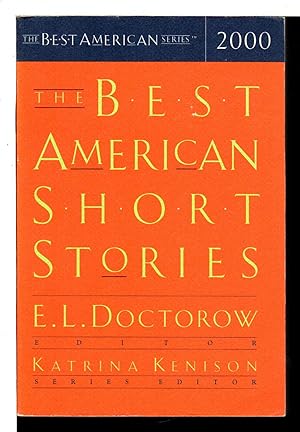Despite increasing competition, this annual collection remains the place to find the most compelling short fiction published in the U.S. and Canada” (PUBLISHERS WEEKLY). To usher in the new millennium, THE BEST AMERICAN SHORT STORIES 2000 brims with a rich variety of lyrical and wise stories about our country’s past, present, and future. This year’s editor, the best-selling author E. L. Doctorow, has chosen new works by Raymond Carver, Amy Bloom, Ha Jin, Walter Mosley, and Jhumpa Lahiri, among others.
The most popular compendium of its kind, THE BEST AMERICAN SHORT STORIES is the only volume that offers the finest short fiction each year, chosen by a distinguished author.
When a great annual collection comes out, it's hard to know the reason why. Was there a bumper crop of high-quality stories, or was this year's guest editor especially gifted at winnowing out the good ones? Either way, the 2000 edition of
The Best American Short Stories is a standout in a series that can be uneven. Its editor, E.L. Doctorow, seems to have a fondness for the "what if?" story, the kind of tale that posits an imagination-prodding question and then attempts to answer it. Nathan Englander's "The Gilgul of Park Avenue" asks: What if a WASPy financial analyst, riding in a cab one day, discovers to his surprise that he is irrevocably Jewish? In "The Ordinary Son," Ron Carlson asks: What if you are the only average person in a family of certifiable geniuses? And Allan Gurganus's "He's at the Office" asks: What if the quintessential postwar American working man were forced to retire? This last story is narrated by the man's grown son, who at the story's opening takes his dad for a walk. Though it's the present day, the father is still dressed in his full 1950s businessman regalia, including camel-hair overcoat and felt hat. The two walk by a teenager. "The boy smiled. 'Way bad look on you, guy.'"
My father, seeking interpretation, stared at me. I simply shook my head no. I could not explain Dad to himself in terms of tidal fashion trends. All I said was "I think he likes you."
The exchange typifies the writing showcased in this anthology: in these stories, again and again, we find a breakdown of human communication that is sprightly, humorous, and devastatingly complete. A few more of the terrific stories featured herein: Amy Bloom's "The Story," a goofy metafiction about a villainous divorcee; Geoffrey Becker's "Black Elvis," which tells of, well, a black Elvis; and Jhumpa Lahiri's "The Third and Final Continent," a story of an Indian man who moves to Cambridge, Massachusetts. Like the collection itself, Lahiri's story amasses a lovely, funny mood as it goes along.
--Claire Dederer![]()
